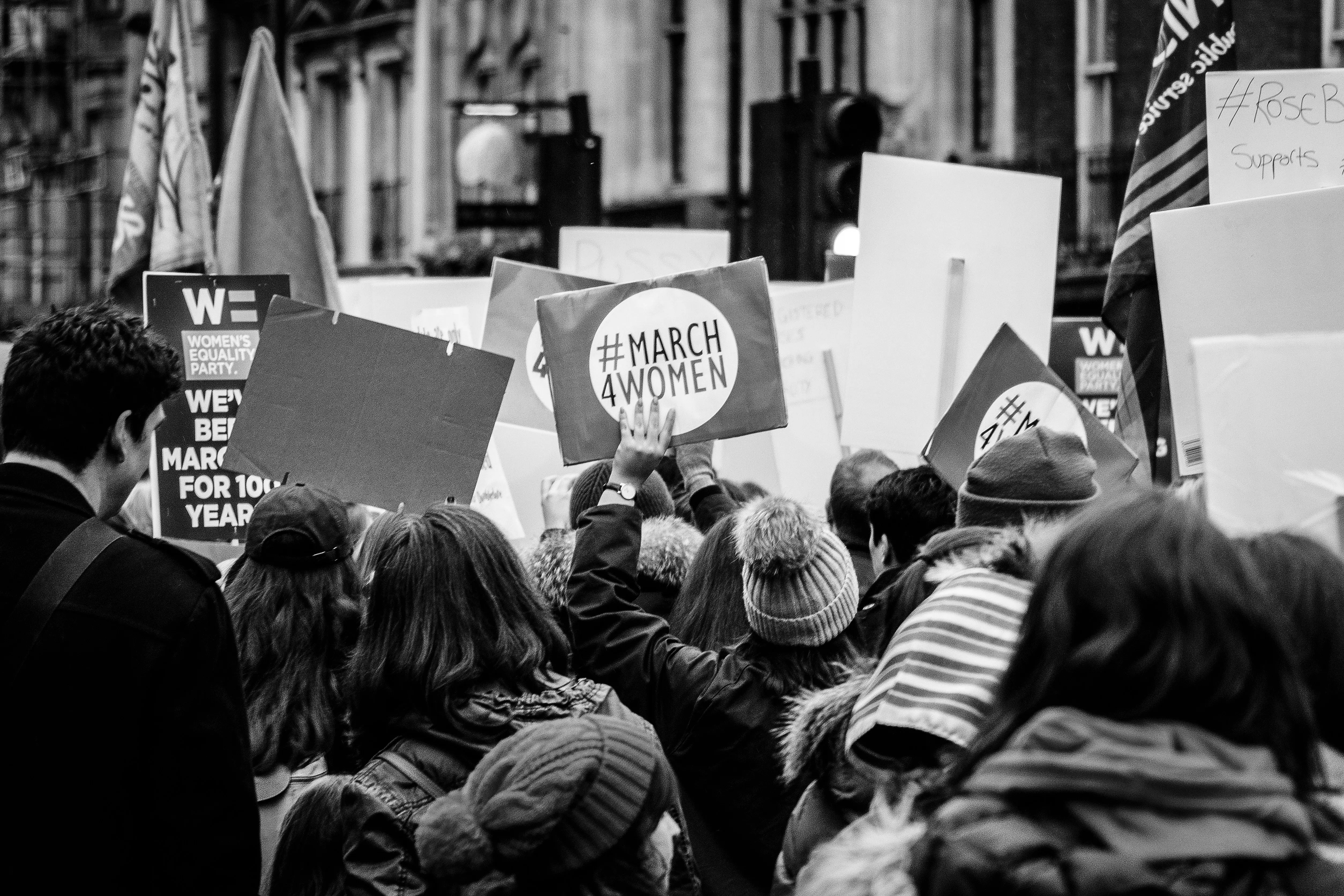Feminism in Ukrainian legislation

The role and development of feminism in legislation. Do human rights matter in modern Ukraine?
Feminism as a social movement for equal rights for women and men is becoming increasingly important in the modern world. In Ukraine, this movement has its own characteristics and development, which is reflected in legislation and social processes. As of 2024, Ukrainian legislation continues to evolve to ensure equal rights for all citizens, regardless of gender. However, despite certain achievements, feminist initiatives face numerous challenges.
Particularly noteworthy are the cases when high-ranking officials make inappropriate statements about women. One such example is a comment made by the Chairman of the Verkhovna Rada of Ukraine, Ruslan Stefanchuk, where he called a well-known politician Iryna Gerashchenko a “good girl”. This incident caused a wide public outcry and prompted a discussion of gender equality and communication culture at the highest level of government.
In this article, we will look at the historical aspects of feminism in Ukraine, the current state of the feminist movement, the legislation governing women's rights, and the impact of feminism on changes in legislation. In addition, we will focus on the challenges and prospects of feminism in the Ukrainian context.
The History of Feminism in Ukrainian Legislation
Feminism in the Ukrainian context has deep roots dating back to the late 19th century. The first organizations aimed at protecting women's rights emerged in the late 19th century under the influence of feminist ideas that were actively considered in Western Europe and the United States. The first Ukrainian women's magazines and newspapers, such as Women's World in the 1890s, were important moments. The most influential organizations of the time were the Union of Ukrainian Women and the Women's Society.
Feminism in the Soviet Union had specific features that distinguished it from Western feminist movements. The main features included:
Official ideology of gender equality: USSR state policy promoted the idea of equality between women and men on paper. Women had absolute equality in rights with men - they were given the opportunity to work in any field and receive higher education.
Promotion of motherhood and family: the state actively promoted the image of a woman as a mother and an executive housewife, reinforcing stereotypical gender roles. Because the communist leadership used the principle of quotas in its power-making activities, women in the Ukrainian SSR-USSR always had a certain number of seats in local and central representative bodies. At the same time, although women under Soviet rule could acquire a variety of professions, only a few of them managed to take up leadership positions.
After gaining independence in 1991, Ukraine began to develop its own legislation, which gradually evolved to ensure equal rights for all citizens. The 1996 Constitution of Ukraine enshrined the principle of equality of all before the law and the prohibition of discrimination on any grounds, including gender. This was an important step towards building a society in which women would have real opportunities for self-realization and self-development.
In the early 2000s, a number of legislative acts were adopted to promote gender equality. For example, the Law of Ukraine “On Ensuring Equal Rights and Opportunities for Women and Men” of 2005 established mechanisms for implementing gender policy at various levels. In addition, in 2011, the Law on Combating Domestic Violence was adopted, which was also important for the protection of women's rights.
The Ukrainian parliament gradually reflected these changes. The number of women MPs in the Verkhovna Rada increased, and gender issues became more and more frequently the subject of parliamentary debate. For example, in 2017, the Electoral Code of Ukraine was amended to include gender quotas for candidates in elections, which was a significant step towards ensuring greater representation of women in politics.
These legislative and social changes reflect the gradual but steady growth of the feminist movement in Ukraine, which has deep roots and continues to evolve in the current context.
The current state of feminism in the international legal field
The current state of feminism in Ukraine is characterized by the active participation of women in various spheres of public life, but politics remains a male-dominated field. According to the official data of the Verkhovna Rada of Ukraine, as of 2024, women account for about 21% of the total number of MPs in the parliament (316 men and 85 women MPs). This shows some progress compared to previous decades, but much work remains to achieve true gender equality.
The list of key legislative acts and international agreements aimed at ensuring gender equality in Ukraine includes:
The Constitution of Ukraine (1996) - establishes the principle of equality of all before the law and the prohibition of discrimination on any grounds.
The Law of Ukraine “On Ensuring Equal Rights and Opportunities for Women and Men” (2005) — defines the basis of state policy in the field of ensuring equal rights and opportunities for women and men.
The Electoral Code of Ukraine (2017, as amended) — includes provisions on gender quotas for candidates in elections, which contributes to increasing the number of women in politics.
Ratification of the Council of Europe Convention on preventing and combating violence against women and domestic violence (Istanbul Convention, 2022) — an international document aimed at protecting women from violence.
Now, during the war, women are playing a very important role and replacing men in professions that have been affected by mobilization and war. Women are actively involved in volunteer activities, home front support, medical and humanitarian missions, and service in the Armed Forces of Ukraine. Their contribution is invaluable, but women's political representation remains insufficient, which underscores the need for further reforms in this area. However, below we will look at how the rights of men are violated in the current legislation of Ukraine.
The influence of feminism on legislative changes
The feminist movement has had a significant impact on the law both in Ukraine and globally. Over the past 30 years, there have been a number of key events and lawsuits that have influenced the development of feminism and legislative changes:
International conventions and agreements: ratification of international conventions, such as the Council of Europe Convention on preventing and combating violence against women and domestic violence (Istanbul Convention), has contributed to the implementation of women's rights standards in national legislation.
Court precedents: court cases, such as the recognition of the right to reproductive health and the right to choose abortion, have influenced the development of modern human rights standards, including women's rights.
Gender quotas and political representation: the introduction of gender quotas for political parties and electoral lists contributed to an increase in the representation of women in parliaments and government bodies.
Legislative initiatives: adoption of laws aimed at combating violence against women, protecting labor rights and combating gender-based discrimination.
Gender quotas are a mechanism used to increase the representation of women or other underrepresented groups in political, economic or social spheres. The main goal of gender quotas is to ensure equal representation of both sexes in decision-making and leadership positions.
There are several types of gender quotas. Legislative quotas may require political parties to include a certain percentage of women on their candidate lists or to reserve a certain percentage of seats in parliament or other government bodies for women. Intra-party quotas are set by political parties themselves and can be rules that require a certain percentage of candidates in elections to be women. Corporate gender quotas are used in some countries to increase the number of women in leadership positions in companies, for example, by requiring a certain percentage of board members to be women.
There are examples of gender quotas in different countries. Norway was the first country to introduce mandatory gender quotas in corporate boards of directors; since 2008, companies have been required to have at least 40% women on their boards. France has introduced a legal requirement that at least 40% of election candidates from each political party be women. Rwanda has one of the highest quotas for women in parliament in the world, where the country's constitution guarantees that at least 30% of parliamentary seats must be held by women.
Gender quotas have their advantages. They increase women's participation in politics and leadership, helping to ensure that they are represented in areas where they have traditionally been underrepresented. However, gender quotas also have disadvantages. Some critics believe that quotas can lead to the selection of less qualified candidates based on gender rather than competence. There is also a risk that organizations may rely solely on quotas instead of addressing the underlying causes of gender inequality.
One of the landmark examples of a court case that influenced the formation of modern human rights standards, including women's rights, is K.L. v. Peru. In this case, the United Nations Human Rights Organization recognized that women have the right to safe and legal abortion as a basic human right. This was the first decision of an international human rights body to establish the responsibility of the government for failing to provide access to legal abortion.
The case was considered because of the situation of a 17-year-old girl, K.L., who was denied a therapeutic abortion, despite the legality of such abortions in Peru, due to a fetal anomaly. This case, which was filed in 2002, drew attention to the violation of her physical and psychological health due to the forced carrying of her pregnancy to term. In 2005, the UN Human Rights Committee recognized that the denial of access to legal abortion violated international standards prohibiting cruel, inhuman and degrading treatment. This court decision forced Peru to improve its policies on sexual violence and access to reproductive services (Center for Reproductive Rights ).
Another important case is R.R. v. Poland, which was considered by the European Court of Human Rights. This case concerned the denial of access to prenatal diagnostics and information that could allow a woman to make a decision about a legal abortion. The Court found that the denial of access to this information and services violated the rights to freedom from inhuman and degrading treatment and the right to respect for private life guaranteed by the European Convention on Human Rights. The judgment obliged Poland to establish effective legal and procedural mechanisms to ensure women's access to full and accurate information about their pregnancy and legal reproductive services, and to ensure that healthcare providers cannot refuse to provide such services on the grounds of “conscience” (Center for Reproductive Rights ).
These events not only reflect progress in the field of women's rights, but also show the importance of global cooperation in improving legislation for all citizens.
Conclusion
Thus, Ukrainian legislation is adapting to modern realities and improving its legal system to be more humane to women and less tolerant of the standards of the Soviet past. However, there is still a significant amount of work to be done to fully meet the standards of a “modern world country”. It should also be remembered that feminism is about equality, not privilege, about mutual respect, not mutual humiliation, about cooperation, not competition. A woman's rights should not humiliate a man's rights, and vice versa. And during martial law, we should not forget that men are no less valuable than women, and protecting their rights should also be a priority for the state, which constitutionally enshrines that human life has the highest value. No one should suffer from inhuman treatment or political intentions of others.










